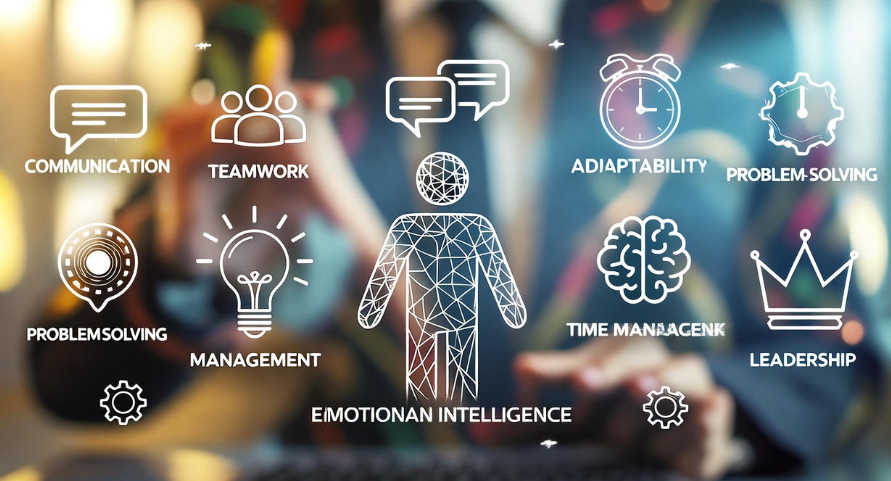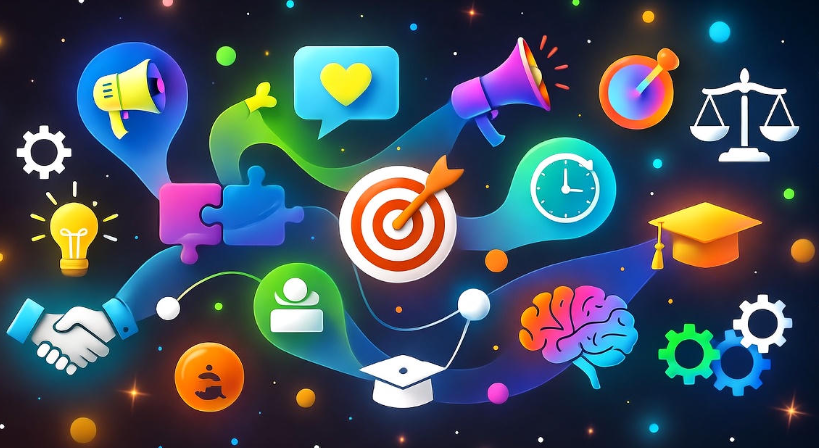In today’s fast-paced professional world, technical knowledge alone is not enough to climb the career ladder. Employers increasingly value soft skills—those personal attributes that shape how you interact with others and handle work situations. Mastering these skills can not only make you more effective but also set you apart in your career. Let’s explore the essential soft skills that can supercharge your professional growth.
Communication Skills
Clear communication is the backbone of every successful career. Whether it’s talking to your team, presenting ideas, or writing emails, how you express yourself matters. Strong communicators are often trusted more and considered for leadership roles.
-
Practice active listening. 🧏
-
Tailor your message to your audience.
-
Use simple language; avoid unnecessary jargon.
Emotional Intelligence (EQ)
Emotional intelligence is the ability to understand and manage your emotions, as well as recognize and influence the emotions of others. High EQ professionals handle stress better, resolve conflicts efficiently, and foster strong team dynamics.
-
Be aware of your emotional triggers.
-
Show empathy toward colleagues.
-
Manage reactions in challenging situations.
Adaptability and Flexibility
Change is inevitable. Professionals who can adapt quickly to new technologies, roles, or team structures are highly valued. Flexibility also shows your willingness to learn and take on new challenges.
-
Embrace change rather than resist it.
-
Stay curious and open-minded.
-
Learn to pivot strategies when needed.
Problem-Solving Skills
Every job comes with challenges. Being able to analyze situations, think critically, and find effective solutions sets you apart. Employers look for individuals who approach problems logically instead of panicking.
-
Break problems into smaller steps.
-
Explore multiple solutions before choosing one.
-
Stay calm under pressure.
Teamwork and Collaboration
No one works in isolation. Your ability to work well in a team, respect diverse opinions, and contribute effectively impacts both personal and organizational success.
-
Share credit for successes. 🏆
-
Respect others’ ideas.
-
Be willing to help colleagues when needed.
Time Management
Managing your time efficiently helps you meet deadlines, reduce stress, and maintain work-life balance. Professionals with good time management skills are more productive and reliable.
-
Prioritize tasks using a to-do list.
-
Set realistic deadlines.
-
Avoid multitasking excessively; focus on one task at a time.
Leadership Skills
Leadership is not just for managers. Taking initiative, motivating others, and guiding teams toward goals are leadership qualities that boost your career.
-
Lead by example. 🌟
-
Encourage and mentor colleagues.
-
Accept responsibility for your decisions.
Networking Skills
Building strong professional relationships opens doors to opportunities, collaborations, and mentorship. Networking is not just about collecting contacts; it’s about nurturing genuine connections.
-
Attend professional events and webinars.
-
Maintain regular communication with your network.
-
Offer help before asking for it.
Creativity and Innovation
In a competitive workplace, innovative thinkers who offer fresh perspectives are highly valued. Creativity helps in problem-solving, improving processes, and introducing new ideas.
-
Brainstorm ideas regularly. 💡
-
Be open to experimenting and taking calculated risks.
-
Observe how others solve problems differently.
Conflict Resolution
Conflicts are inevitable in any workplace. Handling disagreements diplomatically can prevent small issues from escalating and maintain a positive work environment.
Discover more: Step-by-step guide to crack government exams here.
-
Listen to all parties before reacting.
-
Focus on solutions rather than blaming.
-
Maintain professionalism even during heated moments.
Table: Soft Skills Overview
| Soft Skill | Why It Matters | Practical Tip |
|---|---|---|
| Communication | Clear expression & effective interaction | Practice active listening daily |
| Emotional Intelligence | Manage emotions & relationships | Keep a journal of emotional triggers |
| Adaptability | Thrive in change | Take on new challenges proactively |
| Problem-Solving | Find solutions efficiently | Use step-by-step analysis |
| Teamwork | Collaborate and support colleagues | Offer help and share credit |
| Time Management | Increase productivity & reliability | Prioritize tasks with lists |
| Leadership | Inspire and guide others | Lead by example |
| Networking | Create opportunities & mentorship | Attend events and follow up |
| Creativity | Innovative thinking & problem-solving | Brainstorm & experiment |
| Conflict Resolution | Maintain harmony & professionalism | Focus on solutions |

Tips to Improve Soft Skills
Improving soft skills is a continuous process. Here are some actionable tips:
-
Seek Feedback: Regularly ask colleagues or mentors for constructive feedback.
-
Take Courses: Platforms like Coursera, Udemy, and LinkedIn Learning offer soft skill courses.
-
Practice Daily: Apply skills in everyday situations, not just at work.
-
Read and Observe: Learn from role models, books, and podcasts.
-
Reflect: Spend a few minutes daily thinking about your interactions and what could be improved.
FAQs
Q1: Can soft skills be learned, or are they innate?
Absolutely, they can be learned. While some people may have natural tendencies, skills like communication, leadership, and emotional intelligence can be improved with practice.
Q2: Which soft skill is most important for career growth?
It depends on your role. However, communication and emotional intelligence are universally valuable across all industries.
Q3: How can I showcase my soft skills during a job interview?
Provide real-life examples demonstrating how you solved problems, led a project, or effectively worked in a team. Specific stories make your skills believable.
Q4: How long does it take to improve soft skills?
It varies. Small improvements can be noticed in a few weeks, but mastering a soft skill often requires months of consistent practice.
Q5: Do soft skills really impact promotions?
Yes. Many promotions are awarded based on leadership, teamwork, and communication rather than just technical abilities.
Conclusion
Soft skills are the invisible drivers of career growth. They enhance your relationships, improve workplace efficiency, and make you a more valuable professional. By actively developing skills like communication, emotional intelligence, adaptability, and leadership, you create a strong foundation for success. Remember, technical expertise may get your foot in the door, but soft skills will help you climb the ladder—and stay there. 🌟





